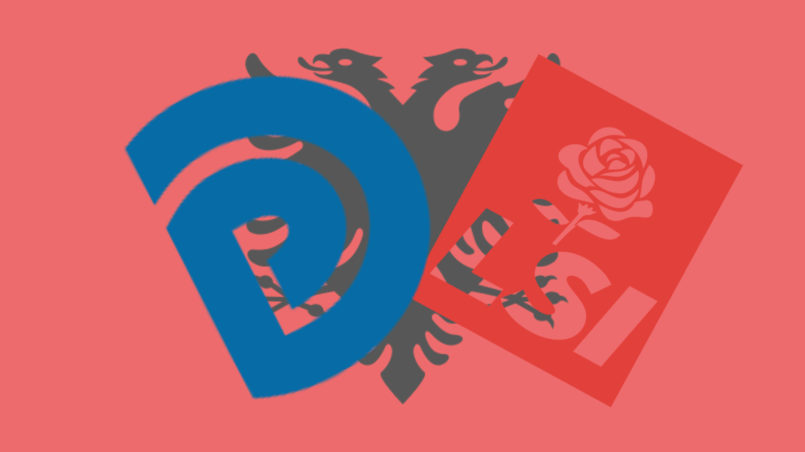On Albania’s Campaign Drama and its Happy Ending

Event data
- Datum
- 13. 6. 2017
- Host
- Institut für den Donauraum und Mitteleuropa und Karl-Renner-Institut sowie die Politische Akademie der ÖVP
- Location
- Presseclub Concordia, Bankgasse 8, 1010 Wien
- Event-type
- Vortrag
- Participants
- Robert Pichler, Professor am Institut für Osteuropäische Geschichte an der Universität Wien
- Ujbien Shehu, Social Identiy Research
- Adelheid Wölfl, Balkankorrespondentin für die Zeitung "Standard"
On Tuesday, June 13, I attended a talk on the political and economic situation in Albania. The speakers were Adelheid Wölfl, who works as a correspondent in the Balkan for the “Standard”, Dr. Ujbien Shehu, who is an Albanian himself, who conducts research on social identity, and Dr. Robert Pichler, who taught at the Institute for Eastern European History at the University of Vienna.
Adelheid Wölfl took the lead, stating that the Democratic Party of Albania has already been boycotting the parliamentary elections for months and that it did not want to participate in the elections during the first free elections in 1991. All attempts by the EU and the USA to convince the Democratic Party to not remove themselves from the game have, until now, been unsuccessful.
The Democratic Party was offered the possibility to choose four ministers prior to the election, to nominate the ombudsman and the head of the Election Commission and to select the chief police officers of the administrative units. But nothing happened. Officially the Democratic Party demanded that Prime Minister Edi Rama steps down and that a government, in which all parties are involved, is formed. They pointed out the money from the huge increase of the illegal cultivation of cannabis. The reason for this boycott is the party’s founder Sali Berisha who still not only directs Lulzim Basha, the current leader of the party, but also the party itself.
Now resistance does not only come from the Democratic Party, but also from the small coalition party, “Socialist Movement for Integration“. However, in the meantime, there are considerations as to whether the inspection committee could be formed without participation of the Democratic Party.
But the USA and the EU would, despite the boycott of the DP, accept the election result. It is also to be expected that the present coalition between the socialists and the Socialist Movement for Integration will continue. As the head of the Socialist Movement for Integration, Ilir Meta, recently elected himself as president with the help of the socialists.
One wanted to give the opposition the opportunity to have a fair election. This discussion is in progress as all of the government personnel are put under a lot of pressure to campaign. Meanwhile, this situation has slightly improved as workers’ groups are being deployed against electoral constraints and it is forbidden to take mobile phones into polling booths, so that the ballot paper cannot be photographed.
Adelheid Wölfl ended here, and Ujbien Shehu then reported on the topics during the election campaign in Albania. He said that Lulzim Basha refers to his experiences from the west, as he studied law in the Netherlands. In contrast, Eli Rama counted on the continuity of his past reforms. He makes corruption and various concepts of the economic policy a subject of discussion and promises the sequel of the integration process and the reformation of the state apparatus.
Under the government of Edi Rama, small businesses in particular are now affected by the new extra tax which Basha promises to reduce by 1.5 percent. Since the introduction of the extra tax for businesses, 30,000 small companies have gone bankrupt.
Now Ujbien Shehu focusses on the past accomplishments of the socialistic Edi Rama government. So far he has the highest percentage of women in the current government, he was able to create a more attractive tourism sector and to reform the education sector. Furthermore, he initiated an expansion of the infrastructure and improved the cooperation with the EU. On the other hand, what he did neglect was the combat of corruption.
Some time ago Rama in fact performed a large-scale raid on the largest cannabis cultivation site, but the problem only shifted. Many families live from the cultivation of cannabis, which is why it is currently more or less tolerated.
This system emerged because, after the fall of the communist government, people were able to name judges after a six-month long course. These are still firmly established in the system. Due to all of these problems, surveys conducted one year ago showed that a majority of the population is considering moving abroad. In any case, everyone still has great hopes regarding the elections.
Now Robert Pichler spoke about his trip to Albania in February. He was primarily in the coastal areas and in the villages of Albania and talked to the people there. He noticed that nearly every family had relatives in other countries, for example in Germany or Italy. Especially people with a good education tend to go abroad. But after the economic crisis in the surrounding countries of Greece and Italy, many Albanians returned.
However, about 1.6 million Albanians are still in foreign countries. As jobs in the care sector are poorly paid, many, especially in this sector educated, women have gone abroad in order to maintain their family. Despite great distances, the solidarity network of families in Albania is very stable, and the Albanians make great use of social media to maintain contact. There are great social differences between “foreign” families who have been successful, and families who have not found any work abroad.
On the coast the great number of hotel resorts is noticeable. In the course of his administrative reform, Edi Rama provided the local administrators with money so that they could implement local building projects. However, the planning and the coordination with the EU funds was not so successful, with the result that many building projects have not been completed.
At this point, Robert Pichler ended his talk and the podium thanked the audience for their attendance.
Addendum due to the changing situation:
In the meantime, the judicial reform has already been successfully completed and the first step was the establishment of an independent review commission which should screen the approximately 800 judges and public prosecutors in the country for their expert and personal capabilities. A delicate affair because many state officials in the justice sector are corrupt and “bought” their posts with pay-offs. A parliamentary special committee officially confirmed this for the first time in 2015. Afterwards it is said that numerous judges bought their positions for up to 300,000 Euro at the High Council of Justice whose chairman is the Albanian state president.
The Democratic Party has now announced that they will take part in the election. At preceding talks between Prime Minister, Rama, and the head of the Democratic Party, Basha, it was agreed that a government with all parties involved, in which the opposition should assume the office of the deputy head of government as well as four important ministries, would be formed. During the negotiations, representatives of the EU and the American Foreign Ministry played an important intermediary role.
Translation into English: Anna Stockenhuber
Credits
| Image | Title | Author | License |
|---|---|---|---|
 |
On Albania’s campaign drama and it’s happy ending | Patryk Kopaczynski | CC BY-SA 4.0 |
